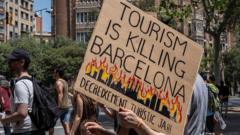Protests in Barcelona highlight the conflict between tourism growth and resident well-being, as locals confront rising rental prices and evictions linked to the burgeoning visitor economy.
Protests Erupt in Barcelona as Locals Demand Control Over Tourism

Protests Erupt in Barcelona as Locals Demand Control Over Tourism
Residents voice frustration against rising tourism issues, citing housing hardships.
On Sunday, a wave of protesters flooded through central Barcelona, voicing their discontent at the increasing number of tourists in their city. Shouting "Go Home!" at the onlookers filming them, they expressed their frustrations at what they perceive as an invasion of their neighborhoods. Passersby in street cafés were doused with water from squirt guns, while a designer store became a target for protest stickers denouncing unwanted visitor presence.
Tourism remains a fundamental part of Spain’s economy, positioning Barcelona as a favorite destination. However, the rapid influx of tourists is leading to complaints from locals who feel they are being pushed out. In response to this overwhelming surge, many residents across southern Europe have begun to demonstrate, demanding changes to tourism regulations.
Protesters highlighted significant challenges, with one resident, Marina, carrying a sign that read, “Your AirBnB used to be my home.” She explained, “We cannot live in this city. The rents are super high because of BnBs and also the expats who come here for the good weather.” Other signs criticized the influx of massive cruise ships, claiming over-tourism is “killing” the city. “Our goal is not to stop tourism entirely but to maintain it at a reasonable level,” Marina asserted.
The march wound towards the iconic Sagrada Familia church, designed by Catalan architect Antoni Gaudí. The previous year saw over 15 million tourists visit, a staggering figure compared to the local population of around 1.6 million. Residents express deep concern for the city's infrastructure and their livelihoods. “It’s not that we dislike individual tourists, it’s the overall management of tourism that needs reform,” noted Elena, a young marine biologist.
It is not just the younger population facing hardships. Pepi Viu, 80, recently lost her home of nearly ten years and is now searching for affordable accommodations amid soaring rental costs. “I can’t find anything – and there’s no support. I feel like I have no protection, and it’s upsetting,” she lamented, currently residing in a hostel.
Joan Alvarez is another resident fighting to maintain his rented apartment amidst the growing pressure from landlords converting properties into high-rent tourist units. After receiving notice from his landlord to move out, Joan refuses to budge, asserting, “This is my house.”
In a response to resident grievances, the Barcelona authorities have announced plans to impose a total ban on short-term rentals by 2028, aiming to cancel around 10,000 tourist apartment licenses. However, landlords like Jesus Pereda, who operates two short-term rentals, believe they are being unfairly targeted. “We’re just an easy enemy,” he contends, attributing increased rental prices instead to so-called “nomad” workers earning higher wages.
Further protests throughout Spain, Portugal, and Italy have echoed Barcelona's outcry, with no clear consensus on how to address the balancing act of tourism and resident needs. As Spain braces for unprecedented tourist arrivals this summer, the discussions surrounding tourism management remain critical.





















